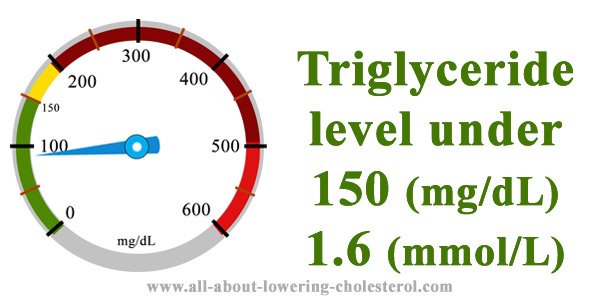
Triglyceride levels lower than 150 mg/dl are considered normal. They are fat that circulates in the blood and store unused energy.
Such levels of triglycerides are associated with minimal or no risk of developing cardiovascular disease and other health complications such as strokes or peripheral arterial disease.
The causes of low triglycerides are a low-fat diet, malabsorption syndrome, some types of drugs, malnutrition, and hyperthyroidism.
What does having triglyceride level lower than 150 mg/dl?
Triglyceride is the end product of digesting fats in meals or else, simply put, they are fat that circulates in the blood and is used to provide energy to the body. Do not mistake triglycerides with cholesterol.
Cholesterol is used to build up cells and certain hormones whereas triglycerides store unused calories and provide the body with energy. Triglyceride levels lower than 150 mg/dl are considered the normal level.
If having such a triglyceride level, then you have minimal risk of developing complications such as cardiovascular disease, stroke, peripheral arterial disease, etc.
Triglyceride level lower than 150 mg/dl – What is the risk for cardiovascular disease?
Triglyceride levels lower than 150 mg/dl are considered OPTIMAL. These levels are associated with minimal risk of developing cardiovascular disease, and its complications such as acute angina, acute myocardial infarction, and even death.
According to the American Heart Society, it is yet not determined whether or not high triglycerides are an independent factor for cardiovascular disease, so further studies need to be done on the matter.
But, it is clear that triglyceride levels lower than 150 mg/dl are associated with minimal risk of cardiovascular disease.
Triglyceride level lower than 150 mg/dl – The risk for any other health problems?
The interest of the healthcare providers is focused more on having high levels of triglycerides rather than low levels.
Levels of triglycerides lower than 150 mg/dl are considered normal and are associated with no risk of developing other health issues such are peripheral artery disease or strokes.
Triglyceride level lower than 150 mg/dl – What might cause such low levels?
There can be numerous causes of having triglyceride levels lower than 150 mg/dl. The most common causes are as follows:
1. Hyperthyroidism – hyperthyroidism is the condition in which the thyroid gland(one of the most important glands in the body) overproduces its hormones(T3 and T4). These hormones are important for normal growth, control of overall metabolism, increasing oxygen consumption, etc.
Hyperthyroidism plays an important role in lowering triglycerides in the majority of patients. If your triglycerides will result in a low range, then, your doctor will advise you a thyroid function test to evaluate the levels of T3 and T4 ( the hormones of the thyroid gland).
If confirmed, then, treatment will be through using anti-thyroid medications like propylthiouracil (PTU) and methimazole (also known as Tapazole).
2. Malnutrition – Malnutrition is a disorder that causes the insufficient intake of nutrients. Chronic malnutrition will deplete the body of its fats, and, therefore, if suffering from malnutrition you will have low levels of triglycerides.
The levels of triglycerides will depend on the degree, type, and duration of the malnutrition. Some of the causes of malnutrition are cancer, various diseases, too much alcohol consumption, poverty, depression, etc.
3. Certain drugs – there are certain drugs that can lower your triglyceride level. The most important drugs are nicotinic acid, statins, ascorbic acid, fenofibrate, clofibrate, gemfibrozil, Asparaginase.
4. Low-fat diet – Levels of triglyceride lower than 150 mg/dl may be a result of an extremely low or no-fat diet.
5. Malabsorption syndrome – This syndrome entails difficulty in digesting or absorbing nutrients from food.
There are a lot of diseases causing this syndrome. The most important are AIDS, cancer, certain medications(certain antacids, antibiotics, etc), certain types of surgery, chronic liver disease, chronic inflammation of the pancreas, after radiation therapy, etc.
